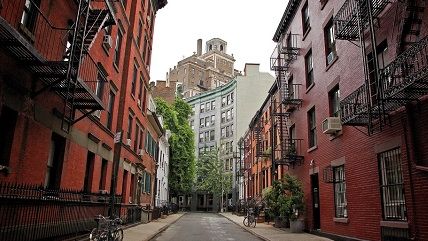New York's Latest Anti-Airbnb Effort Could Violate First Amendment
Effort targets advertising since renting your place out for under 30 days is already illegal.

An effort backed by unions and the hotel industry might succeed in shutting down Airbnb in New York.
Doing so might require the state government to violate the First Amendment.
The New York State Senate voted last week to approve a bill banning online advertising for short-term apartment rentals. The measure makes it possible for Airbnb hosts to rent rooms or part of their living space, but would make it illegal to rent an entire apartment on the website, or on any of its competitors.
Renting an apartment for less than 30 days is already against the law in New York, and this new proposal is really an enforcement mechanism designed to make it more difficult for anyone who was already ignoring that ban.
It comes with stiff penalties, too. First-time offenders would be fined $1,000 and repeat offenders would have to pay as much as $7,500 for every online rental listing.
Christina Sandefur, an attorney and vice president of the Arizona-based Goldwater Institute told Watchdog that the bill might violate the First Amendment by unconstitutionally limiting what New Yorkers can say—or, in this case, write online.
"Prohibiting people from advertising their homes online would appear to be a violation of free speech rights," Sandefur said in an email. "Of course, the First Amendment protects the free exchange of information, so long as it isn't fraudulent or misleading."
The bill is currently on Democrat Gov. Andrew Cuomo's desk, awaiting his decision to sign or veto it.
The battle lines are pretty much what you've come to expect from these short-term rental fights. The hotel industry and various union groups have pushed for the legislation, as a way to shut down competition.
"This bill, once it's signed into law, will send a strong message that we prioritize hardworking New York families and affordable housing, and will give law enforcement the tools they need to crack down on illegal hotels," Assemblywoman Linda Rosenthal, D-Manhattan, who sponsored the legislation, said in a statement about the bill's passage.
Airbnb, meanwhile, says the advertising ban will really hurt New Yorkers the most, by making it harder for some people to pay their bills by renting their extra space.
Beyond the local fight between hotels and the online marketplaces that seek to compete with them, big constitutional questions are at play here. Other states and cities will be looking to New York's legislation as they craft their own rules for short-term rentals.
Courts have long held that there can be some small limitations on free speech—shouting "fire" in a movie theater being the most oft-cited example, even if many people misunderstand the point Justice Oliver Wendell Holmes was trying to make when he wrote that—if that speech is meant to incite criminal behavior.
There's the rub. Since New York has criminalized Airbnb rentals and turned anyone who uses the room-sharing services into law-breakers, the ban on public advertising might be able to skirt around otherwise robust protections for free speech, Sandefur said.
In other words, New York's state government could get away with infringing on free speech because it made the subject matter of that speech illegal.
"It's pretty scary stuff—if government can criminalize harmless behavior in order to avoid the First Amendment, our rights are doubly at risk," Sandefur said.
This article originally appeared at Watchdog.org


Show Comments (219)